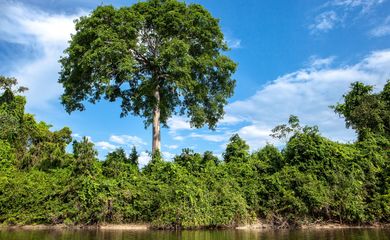Brazil seeks little funding overseas for green economy: specialist


One of the problems in Brazil’s efforts to complete infrastructure projects and preserve the environment is not in environment legislation or the economic crisis making public investment scarce. In certain cases, international institutions have money available, but they are unable to lend it to the country.

The statement was made by Ivan Oliveira, director for Studies and International Economic and Political Relations with Ipea, the government’s economics institute. During the 1st Americas Regional Ministerial Conference on Green Economy, in Fortaleza, Ceará state, Oliveira called for more engagement from Brazil and multilateral institutions—like international banks, with capital from multiple countries—to unblock funding for sustainability projects in the country.
The most symbolic case, Oliveira said, is the New Development Bank (NBD). Created in 2014 by the Brics—Brazil, Russia, India, China, and South Africa—the institution is headquartered in China and has lent little funding so far.
“Today, Brazil avails itself of less funding than it brought as investment to the NDB, a bank that has a say when it comes to green economy, as it was designed to focus on financing infrastructure and sustainability projects. The sustainability agenda is part of its DNA,” he said.
The difficulties in demonstrating the viability of projects may be hindering Brazil’s access to international funding. He named the project on the high-speed train connecting the cities of Rio de Janeiro, São Paulo, and Campinas, which could reduce the cost of fossil fuels, but never materialized because financial assessment did not work out. The challenge, he said, lies on both sides: increasing the viability of projects and the engagement of multilateral institutions.
“Multilateral banks need to have a more important role in funding this type of project. More than that, Brazil and several other countries must be more pro-active in making projects that lack funding viable, so that the debate about sustainable development can become deeper and materialize,” he declared.
Oliveira also advocated a more opened Brazilian economy, with more banks operating in the country. More competition between institutions, he pointed out, could help reduce final interest and make projects that cannot be funded by private capital today more viable.
Carbon credit
Eduardo Piquero, director-general of the Mexican Carbon Platform, a voluntary market of carbon credits in the Mexican Stock Exchange, argued for more awareness among big-time investors on the funding of sustainable projects. Through the carbon credit market, companies and people compensate for their carbon emissions with the purchase of securities to finance economically correct projects and initiatives to reduce poverty.
Pension funds, insurance firms, and investment funds, Piquero reported, have $15 trillion invested across the world. A third of which are in fossil fuels which will not have revenues a few years from now, like oil refineries and coal plants. “We must understand that climate change is a great risk, it’s a great incentive,” he warned.
Regulation
Claudio Esteban Albornoz, chair of the Committee for Economic Development, Productivity and Small Businesses with Ecuador’s Parliament, said regulation is key to encouraging the funding of sustainable projects. He instanced Ecuador’s Law on Energy Efficiency, which plans to lower the number of fossil fuel–powered vehicles in the country as it grants incentives to funds financing sustainable energy projects and technology.
“There’s an economic motivation, driven by the consumers’ preference for projects with green trademarks. There’s an opportunity for investment, so I think there must be a legal motivation for the restrictions on the supply of goods and services [like the limitation of fossil fuel cars]. This is a topic to be covered by regulations.
The 1st Americas Regional Ministerial Conference on Green Economy was held from June 24 to 26 by the World Green Economy Organization, the United Nations Office for South–South Cooperation, and the Instituto Brasil África.
*The reporter flew to Fortaleza at the invitation of the United Nations Development Program.



